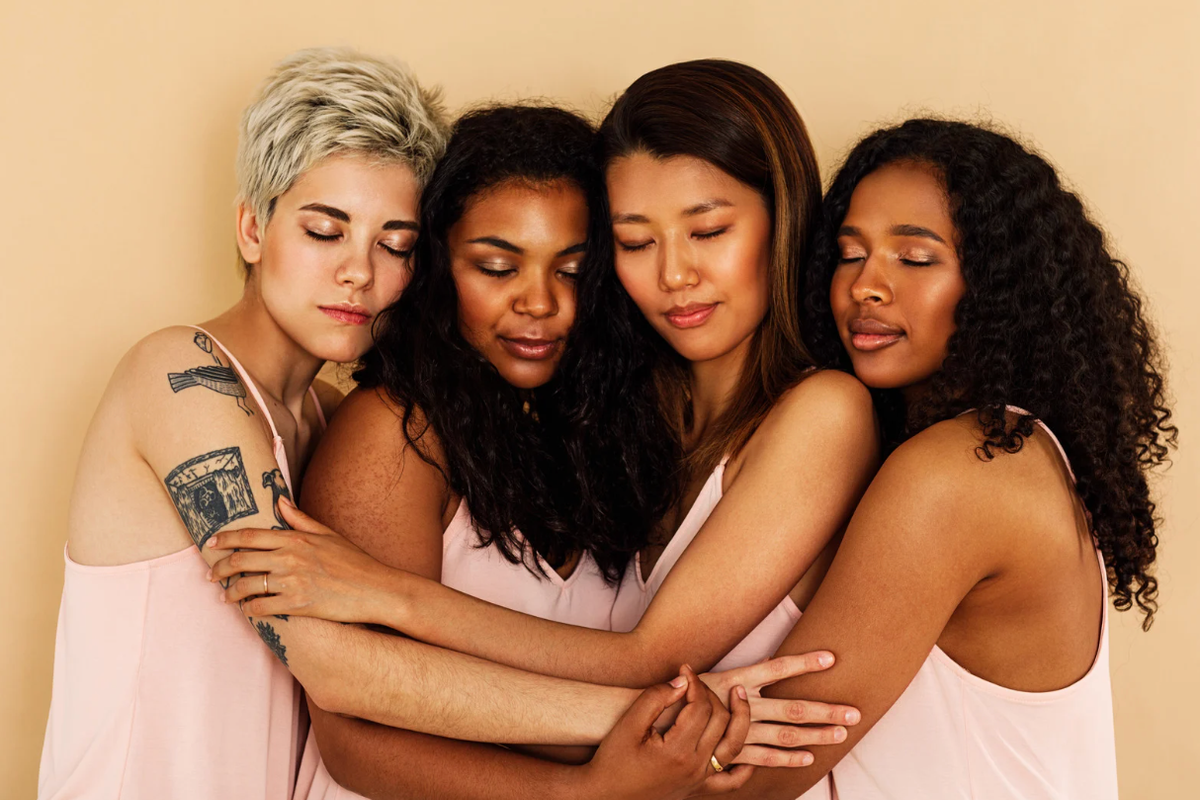Women share the 'girl codes' they'd never break, even for women they just met
“Tampons and hair ties belong to whoever needs them.”
Four women in pastel tops embracing each other, eyes closed, against a warm background.
There is an informal, yet sacred social contract many women follow instinctively. You won’t find a manual on it, per se, but it lives in bathrooms, parking lots, parties, doctors' offices, group chats, and chance encounters with strangers, known to women as “girl code.”
This solidarity takes on many forms. Sometimes it looks like it helps prevent embarrassing fashion malfunctions. Other times it looks like helping a stranger home after they’d had too much to drink. But at its core, girl code is all about protection, dignity, and kindness.
Recently, women on Reddit shared their own example of “girls codes they’d never break,” and it paints a vividly clear picture about what makes female connection so uniquely special.
1. The bathroom sisterhood
Any bathroom is hallowed ground. Period. Many women described it as the place where strangers become instant allies.
“If I'm next in line, I'll hold your door until another stall is available, then pass door holding duty to the lady behind me.”
“If any women asks me to do a ‘check’ with their pants, I’ll always check. I’ve had strangers ask before and I’ve had to ask strangers.”
“If they have something in their face or if their skirt is tucked into their underwear… TELL THEM!”
“Bathroom hangouts in bars mean sisterhood, we are now best friends. Need someone to hype you up? On it. Need someone to leave with you and find your friends? Yes, queen. Need a good cry and vent about that stupid person in your life? F**k that person, I hate them now too.”

2. The safety pact
Safety sits at the heart of girl code. When another woman signals distress, the response is immediate and unquestioned.
“If a woman comes up to me pretending I am her auntie, I am her goddamn auntie. Her mum and I were separated at birth.”
“‘Don’t let that guy know i’m here or where i am’ YES MRS PRESIDENT.”
“I’ve had quite a few women come up to me and my friends for safety to get away from someone. I will ALWAYS play along.”
“Don't leave a girl/woman alone when she's inebriated at a party. You just never know.”
3. The honesty and loyalty clause
Honesty that protects, rather than wounds, is a key part of these unwritten rules.
“If someone can't fix the problem (cosmetic) in like 5-10 minutes, I don't bring it to their attention.”
“If another woman asks me for the name of my perfume/where I bought my dress I will always tell her.”
“I will never ever ask a woman when her baby is due, unless she tells me she is pregnant.”

“Even if we aren't friends anymore, I'll never spread your secrets. They go to the grave with me one day as I promised.”
And when relationships go wrong, accountability is aimed in the right direction.
“If a guy cheats on me with a girl and she didn't know about me when it happened, then she and I are not enemies.”
“If I know another woman's SO has cheated, I'm telling her.”
4. The sharing economy
Girl code comes with a simple rule: share what you have, especially when it matters most.
“If someone asks for a pad/tampon and you have a spare? You. Give. It. To. Them.”

“Tampons and hair ties belong to whoever needs them.”
“If I saw them stealing pads/tampons or baby products, I didn’t see sh*t.”
5. The universal compliment policy
Women know how much a kind word can mean.
“I always tell a woman if I think an item of clothing or hair style or hair colou or accessories look stunning on her.”
Over on TikTok, you might have seen folks using the phrase “I love it when women” to share their admiration and respect. After reading all these answers, it rings even more true. Long live girl code.

